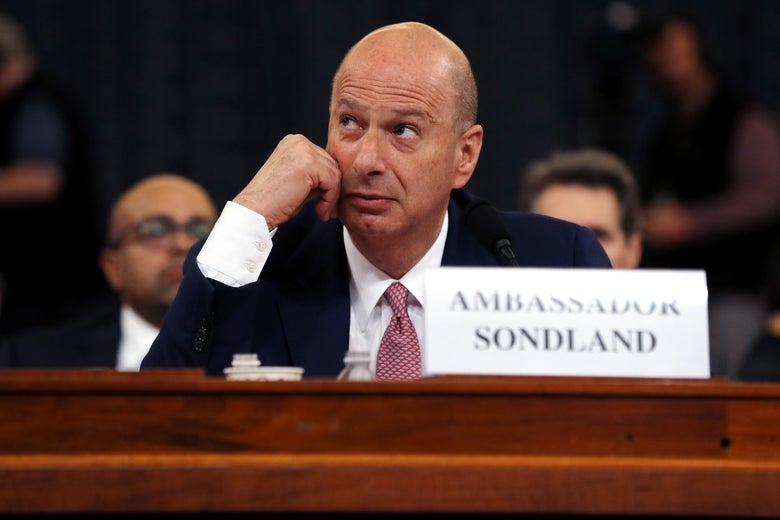
Gordon Sondland, the U.S ambassador to the European Union, was particularly evasive during his hearing.
Chip Somodevilla/Getty Images
There was an awkward, tentative mood to the questioning of Gordon Sondland, the U.S. ambassador to the EU, in Wednesday’s impeachment hearings. Sondland’s opening statement delivered the most explicit confirmation yet of a presidential quid pro quo—but as one of the “Three Amigos” who helped execute the Ukraine pressure scheme, and someone who had been forced to repeatedly revise his earlier statements after other witnesses had contradicted his account, he kept most of his testimony hedged and evasive.
One of the most confounding aspects of his testimony dealt with his understanding of the president’s motivations in targeting the Ukrainian energy company Burisma, which had put Hunter Biden on its board. Although Sondland testified that Trump had asked him whether Ukraine was going to investigate Burisma, he repeatedly said that he could not recall Trump mentioning Joe or Hunter Biden and that he had not realized that Trump was trying to use Burisma to get at the Bidens. Eventually, Sondland acknowledged that he now understands that Trump was trying to get at the Bidens through Burisma, thanks to the September release of the write-up of the president’s July 25 call. But despite this admission, Sondland maintained all day that he hadn’t realized this before reading the account of the call.
Near the end of the proceedings, Democratic Rep. Sean Maloney of New York dropped the polite cajoling that had greeted Sondland’s account of events. Maloney was trying to get Sondland to admit that Trump’s motivations re Burisma and Biden ought to have been clear and that Sondland’s personal profession of ignorance didn’t change the president’s underlying aims. Sondland was doing what he had done all day: delicately maintaining his line.
It all led to this relentless testimonial spiral:
Maloney: Who would benefit from an investigation of the president’s political opponent?
Sondland: Well, presumably the person who asked for the investigation.
Maloney: Who’s that?
Sondland: If the president asked for the investigation, it would be he.
Maloney: Well, it’s not a hypothetical, is it, sir? We just went around this track, didn’t we? The president asked you about an investigation. He was talking about the Bidens. When he asked you about the Biden investigation, who was he seeking to benefit?
Sondland: He did not ask me about the Biden investigation. I’ve said that about 19 times.
Maloney: Sir, we just went through this. When he asked you about investigations, which we all agree now means the Bidens—we just did this 30 seconds ago, right? It’s a pretty simple question, isn’t it? I guess I’m having trouble [understanding] why you can’t just say—
Sondland: When he asked about investigations, I assumed he meant—
Maloney: I know what you assumed. But who would benefit from an investigation of the Bidens?
Sondland: They’re two different questions.
Maloney: I’m just asking you one. Who would benefit from an investigation of the Bidens?
Sondland: I assume President Trump would benefit.
Maloney: There we have it! See? Didn’t hurt a bit, did it?
[applause from the committee room]
Sondland went on to object to what Maloney was “trying to do.” Maloney responded by reminding Sondland about his broader evasiveness as a witness: The ambassador had altered the original testimony he gave to the committee in October, at times directly contradicting what he’d previously claimed. “We appreciate your candor, but let’s be really clear on what it took to get it out of you,” snapped Maloney.